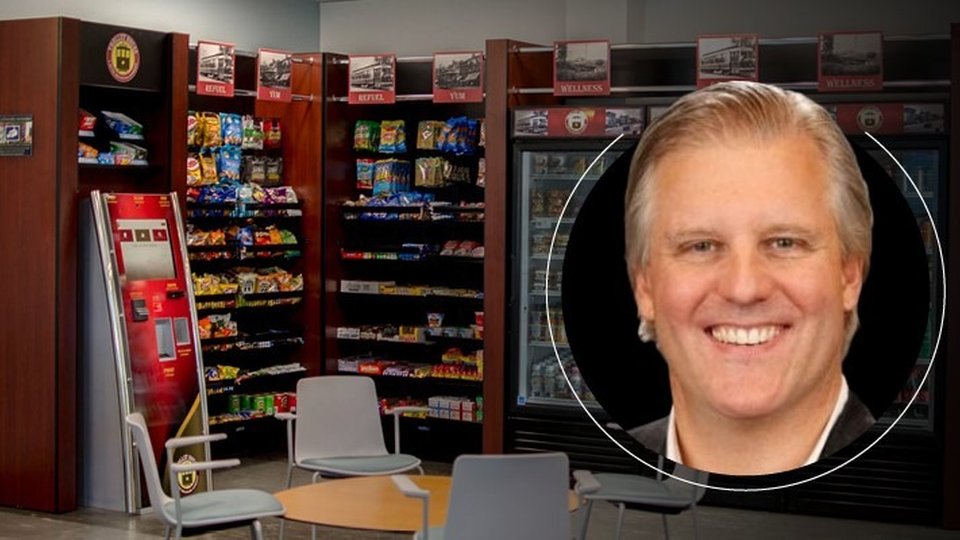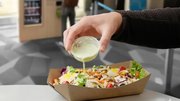Vending
Diversification key to success for independent convenience services market leader
Scott Halloran, CEO of Trolley House Refreshments in Richmond, Virginia, was able to sustain much of his foodservice business by expanding into a virtual restaurant when the coronavirus pandemic hit.

July 21, 2021 by Elliot Maras — Editor, Kiosk Marketplace & Vending Times
As the CEO of the largest independent convenience services operation in his market, Scott Halloran, of Trolley House Refreshments in Richmond, Virginia, is excited about attending the NAMA Show in New Orleans next month.
The first convenience services trade show since the coronavirus pandemic hammered the economy, next month's show combines the NAMA show with the Coffee Tea & Water show, which are traditionally separate events.
Halloran, who sits on the NAMA board of directors, is looking forward to seeing his colleagues and what's new on the trade show floor — his first such opportunity since the pandemic began last March.
"Coming out of the pandemic, the thing I'm most excited about is re-engaging with the convenience services as a whole," Halloran told Vending Times in a phone interview. "This'll be the first event since the pandemic for the industry coming back to life."
"Personally I'm excited to see more on the CTW side," he said. "I've been to NAMA many times, but I've just never been able to make it to CTW (the coffee tea and water show)."
Trade shows are especially important for independent operators like Halloran, who need a diverse portfolio of products and services to compete against their larger competitors.
Diversification necessary to succeed
 |
| Micro markets have become one of the most important services for Trolley House Refreshments. |
"You have to have a very diverse portfolio of services if you want to remain competitive," he said. "If you don't, you just can't compete."
Embracing technology is also certainly important as customers have become more savvy about it.
"When I started in this business, the barriers to entry were few," Halloran said. "The barriers to entry are far greater today. In some regards it may be easier since the industry has evolved through the technology with the VMS (vending management system) packages and a variety of other things, but if you were starting out from scratch today — and had to be able to provide micro markets, vending, coffee and all the bells and whistles that your customers demand — I think it's a little bit more daunting."
Company expands into virtual restaurant
Being diverse proved especially important to Halloran when the pandemic forced the company's stand-alone restaurant, Parterre, to close, along with many vending, micro market, OCS and pantry service accounts.
 |
| Expansion into a virtual restaurant proved crucial to surviving the pandemic for Trolley House Refreshments. |
In response, the company started a virtual restaurant out of its catering kitchen called Trolley Eats, tapping third-party delivery services. So far, Trolley Eats has proved helpful in enabling the company to recover from the pandemic. The virtual kitchen allowed the company to sustain half its 70-person catering staff.
Trolley House Refreshments partnered with Wow Bao, an Asian street food brand that offers its food to other restaurants for delivery using third-party restaurant delivery services like Grubhub, DoorDash, Postmates and Uber Eats.
Wow Bao became the founding brand for Trolley Eats.
"We did Wow Bao as a test before we even opened up Trolley Eats just to see how it would work to have a 'to go' restaurant inside our catering kitchen," he said.
The test proved successful, and the company has supplemented the Wow Bao offerings with its own brands, such as 1888 Pizza, Get Stuffed, Jazz Burger, Torpedoes Sub Shop and Get Baked.
"Catering was literally turned off March 15," Halloran said. "It was either lay off the entire team and wait a year to come back to life or find some other path to keep them mentally engaged and do something new and exciting."
"Marketing is a big deal," he said for the virtual restaurant. The company has increased its use of social media advertising (using Google, Instagram and Facebook) and email marketing.
"We're taking what we're learning there (with Trolley Eats) and we can apply it to our convenience services business," he said.
The company also began offering family meals though its catering operation and began servicing school fundraisers as well as employee meals for its convenience services customers.
Technology continues to offer new benefits
The company also began offering a touchless beverage cooler in its OCS division when Bevi, one of its POS beverage equipment providers, introduced a touchless option.
"They (Bevi) responded very quickly to what was happening and created a touchless solution which they were actually able to roll out and implement," Halloran said. "You scan a QR code at the actual Bevi unit. You were able to dispense your product using your phone."
Customers responded favorably to the touchless Bevi, especially early in the pandemic when some of them expressed concern about employees having to touch products and hard surfaces.
That particular concern has since subsided.
"Most folks are realizing that the button they push on the vending machine or the door handle they use to open the micro market are not the culprit of the pandemic," he said. "I just don't see that (touchless) as a driver of the industry going forward."
Meanwhile, Halloran continues to explore technology on other fronts.
One new initiative is an automatic marketing and CRM system called Hub Spot.
The company is also working on a data visualization tool called Tableau to assist with routing and merchandising.
Employees remain key to success
While technology has become more important in today's market, Halloran said the twin cornerstones for success are the same as always: good customer service and good employees.
"Now the struggle is finding staff," he said. There were 5,000 job openings in the Richmond area and no applicants.
"When we interview people today, we're interviewing to see they are a cultural fit as much as they have the skill sets," he said. "You can train people the skillsets, but you cannot teach people the right attitude if they don't have it."
 |
| The company has moved to all refrigerated trucks as it has mixed its micro market and vending routes. |
Halloran consolidated his routes by 25% and is now operating 12 routes. Many of the vending and micro market routes have merged.
"We made the decision to move to all refrigerated route trucks because food is becoming such a large percentage of what we do," he said. "Even on the pantry front you're dealing with a lot of refrigerated items."
The company, which was near the $15 million annual revenue mark pre-pandemic, is in a recovery mode. Sales historically have been 28% foodservice, 22% vending and 36% micro markets, with balance OCS, pantry service and bottled water service.
"We're seeing steady growth," Halloran said.
Photos courtesy of Trolley House Refreshments.
About Elliot Maras
Elliot Maras is the editor of Kiosk Marketplace and Vending Times. He brings three decades covering unattended retail and commercial foodservice.







